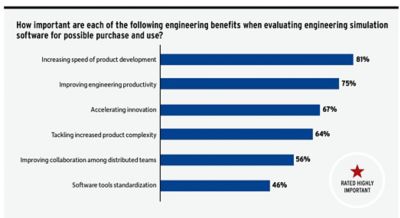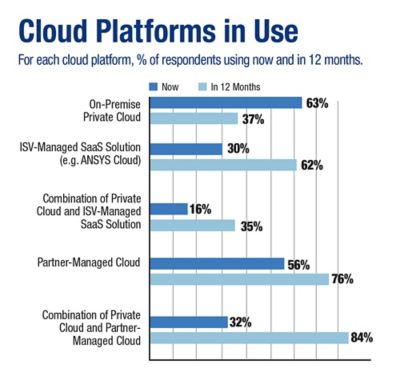-
United States -
United Kingdom -
India -
France -
Deutschland -
Italia -
日本 -
대한민국 -
中国 -
台灣
-
Ansys si impegna a fare in modo che gli studenti di oggi abbiano successo, fornendogli il software gratuito di simulazione ingegneristica.
-
Ansys si impegna a fare in modo che gli studenti di oggi abbiano successo, fornendogli il software gratuito di simulazione ingegneristica.
-
Ansys si impegna a fare in modo che gli studenti di oggi abbiano successo, fornendogli il software gratuito di simulazione ingegneristica.
-
Contattaci -
Opportunità di lavoro -
Studenti e Accademici -
Per Stati Uniti e Canada
+1 844.462.6797
ANSYS BLOG
October 8, 2019
Simulation User Survey Talks Moving to The Cloud and Best Practices
Ansys and Digital Engineering have launched a simulation user survey that provides best practices and adoption insights to those moving to the cloud.
The survey shows that the cloud is taking hold in the simulation world. For instance, 17% of respondents are currently using the cloud and another 20% plan to do so within 12 months.
The growing need for cloud options is fueled by the trend of users increasing the size of their simulations. These large simulations require more high-performance computing (HPC) and data storage resources.
20% of simulation users
plan to move to the
cloud in the next 12 months.
In fact, the survey notes that over a third of users reach peak computing capacity a few times per month. When these moments occur, users can access cloud resources to meet the need of additional storage and HPC.
Respondents were requested to note if they worked for a large, medium or small company. Based on those responses, 42% of those that are already using the cloud for simulation purposes are working for larger companies — while those working for medium and small companies split the remainder evenly at 29% each. However, smaller companies appear to be adopting the cloud faster than others, with 44% of respondents working for small companies reporting that they plan to implement the cloud in the next 12 months — compared to those working for large- and medium-sized companies reporting at 35% and 21%, respectively.
These cloud initiatives are also moving beyond the experimental stage, as 46% of respondents are proficient using simulation-enabled cloud services for production or business-critical workloads.
If an engineering business is going to keep up with the trends, it needs to start adopting simulation-enabled cloud services sooner rather than later.
Why Simulation Users and Companies Are Moving to the Cloud
In general, respondents are saying that the companies they work for are engaged in cloud-based solutions because they are looking for flexibility and lower cost.
Respondents note the top engineering benefits for simulation cloud adoption.
In fact, the top three reasons why simulation-enabled companies are moving to the cloud are:
- The ability to scale up quickly (49% of respondents)
- The lower overall costs (40% of respondents)
- The lower maintenance costs (33% of respondents)
When it comes to engineering benefits, respondents say that the top three reasons companies pursue cloud adoption are:
- Accelerating product development
- Improving productivity
- Accelerating innovation
Considering the reasons companies are adopting the cloud, any firm lagging behind the competition should start to implement some fundamental cloud best practices and adoption procedures.
Cloud Best Practices for Simulation
Firms that have yet to adopt cloud-based simulation tools may be interested in best practices that have been discovered by the study. The top three cloud best practices noted by the survey’s respondents were:
- Test and share potential time savings with decision-makers.
- Address cloud concerns (like security) early in the process.
- Start small.
Respondents note how their organization adopted the cloud.
Engineers will need to perform many tests to make sure that decision-makers clearly see the benefits of the cloud. They will need to understand how the cloud saves time and how that translates into productivity gains, increased throughput, reduced time-to-market and cost savings.
Not every company is comfortable processing or storing simulations on the cloud. In fact, security is considered the most pressing concern, according to 59% of respondents. The location of data storage was another major concern, according to 51% of respondents.
Current cloud simulation users, or those that plan to deploy within the next year, may have some answers to alleviate these concerns. They recommend:
- Researching cloud computing options to understand storage locations and safeguards (41% of respondents)
- Learning about the risks involved with the cloud to better understand how to mitigate them (37% of respondents)
- Enlisting a company’s IT team to help evaluate security policies and standards for the cloud (31% of respondents)
Finally, many respondents noted that having lofty goals during the start of a cloud simulation initiative can undermine the entire enterprise. They suggest finding small simulation projects that have been difficult to support with internal resources. Then, launch a pilot to prove that the cloud has value. Engineers who target the pain points of these particular projects should quickly gain support to expand the cloud to other systems.
Moving to the Cloud Is Not a One-Size-Fits-All Solution for Every Simulation User
The survey found that respondents are using a mix of on-premise, partner-managed and hybrid cloud approaches.
The cloud options simulation users currently use and what they will use in the
next 12 months (Note: respondents could choose multiple answers to these questions).
Over the next year, that mix is going to change significantly. Currently, the majority of cloud users are using a private, on-premise solution. Over the next 12 months, however, respondents expect to shift to either:
- A managed software-as-a-service (SaaS) from an independent software vendor (ISV), where the software provider also provides the cloud infrastructure
- A combination of a private cloud and an ISV-managed SaaS solution
- A partner-managed cloud using public data centers or regional data centers, where the cloud infrastructure is provided by a separate vendor to the software provider
- A combination of private cloud and partner-managed cloud
Companies can implement many of these cloud strategies using Ansys pervasive engineering simulation software. For instance:
- The Ansys Cloud provides a managed cloud platform service that offers on-demand HPC within Ansys Mechanical, Ansys Fluent and Ansys Electronics Desktop.
- The Ansys platform is also available through cloud hosting partners in a variety of setups.
- The customer can also manage a cloud configuration, within a controlled environment, through a private cloud or infrastructure-as-a-service platform.
Many companies are already capitalizing on cloud-enabled simulation and a growing number of others are preparing to do so shortly. With on-demand access to HPC resources, these organizations have been, and will be, able to accelerate their simulation activities. To learn more watch the webinar: Embrace or Skip Cloud-Enabled Simulation? Survey Says. Or, download the full survey, here.














